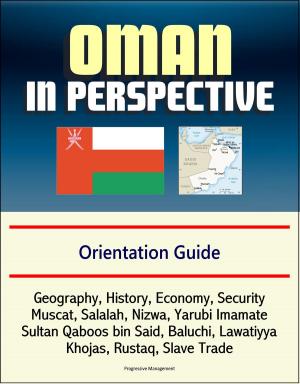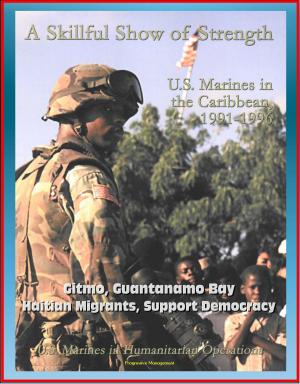21st Century Peacekeeping and Stability Operations Institute (PKSOI) Papers - Mass Atrocity Prevention and Response Options (MAPRO): A Policy Planning Handbook - Stopping Genocide
Nonfiction, History, Military, United States, Social & Cultural Studies, Political Science| Author: | Progressive Management | ISBN: | 9781310097454 |
| Publisher: | Progressive Management | Publication: | November 29, 2013 |
| Imprint: | Smashwords Edition | Language: | English |
| Author: | Progressive Management |
| ISBN: | 9781310097454 |
| Publisher: | Progressive Management |
| Publication: | November 29, 2013 |
| Imprint: | Smashwords Edition |
| Language: | English |
This Handbook is designed to be a reference for policy makers to monitor, prevent, and if necessary respond to genocide and other mass atrocity situations. It addresses topics promulgated in the August 2011 Presidential Study Directive on Mass Atrocities (PSD-10) as well as recommendations contained in Preventing Genocide, the 2008 study published by the Genocide Prevention Task Force (GPTF).
Effective mass atrocity prevention and response options (MAPRO) should happen early. The longer it takes to act, the greater the risk that mass atrocities will occur and more people will die. On the other hand, inadequate time devoted to planning and risk assessment can result in ineffective MAPRO measures or undesired second-order effects. This is why it is essential for the USG and the international community to have in-place policies, plans, doctrine, and procedures before we are faced with mass atrocity situations.
Failure to respond to mass atrocities is often attributed to lack of political will, but ineffective policy processes are also culpable. This Handbook has been developed to assist members of the interagency policy community in developing whole-of-government prevention and response options to assist senior leaders who are deliberating genocide and/or mass atrocity (GMA) situations. The templates in this Handbook are intended as aids in this process, and should be adapted as appropriate to fit circumstances and personalities involved. They may serve as useful points of departure for seasoned practitioners as well as relative newcomers to policymaking.
Important studies on U.S. Government MAPRO responses have observed that the policymaking process is skewed towards inaction. This is due, in part, to government processes emphasizing the potential risks and costs of positive action. It is also due to the sheer challenge of interagency information processing and decision-making. The main goal of this Handbook is to offer a process and substantive MAPRO considerations to help the policy community digest information, develop a variety of options, and tee up relevant information for decision makers. Additionally, the MAPRO Handbook seeks to reduce the risks and costs related to MAPRO, by capitalizing on a range of current, in-place engagement activities that can be applied to prevent and mitigate potential threats before they escalate to actual mass atrocities.
Part I of the MAPRO Handbook introduces background and context, and defines mass atrocities as "Widespread and often systematic acts of violence against civilians or other noncombatants including killing; causing serious bodily or mental harm; or deliberately inflicting conditions of life that cause serious bodily or mental harm." It describes how genocides and mass atrocities often develop and highlights the governmental challenges of identifying GMA situations, deciding what to do about them, and taking action to prevent or respond.
This Handbook is designed to be a reference for policy makers to monitor, prevent, and if necessary respond to genocide and other mass atrocity situations. It addresses topics promulgated in the August 2011 Presidential Study Directive on Mass Atrocities (PSD-10) as well as recommendations contained in Preventing Genocide, the 2008 study published by the Genocide Prevention Task Force (GPTF).
Effective mass atrocity prevention and response options (MAPRO) should happen early. The longer it takes to act, the greater the risk that mass atrocities will occur and more people will die. On the other hand, inadequate time devoted to planning and risk assessment can result in ineffective MAPRO measures or undesired second-order effects. This is why it is essential for the USG and the international community to have in-place policies, plans, doctrine, and procedures before we are faced with mass atrocity situations.
Failure to respond to mass atrocities is often attributed to lack of political will, but ineffective policy processes are also culpable. This Handbook has been developed to assist members of the interagency policy community in developing whole-of-government prevention and response options to assist senior leaders who are deliberating genocide and/or mass atrocity (GMA) situations. The templates in this Handbook are intended as aids in this process, and should be adapted as appropriate to fit circumstances and personalities involved. They may serve as useful points of departure for seasoned practitioners as well as relative newcomers to policymaking.
Important studies on U.S. Government MAPRO responses have observed that the policymaking process is skewed towards inaction. This is due, in part, to government processes emphasizing the potential risks and costs of positive action. It is also due to the sheer challenge of interagency information processing and decision-making. The main goal of this Handbook is to offer a process and substantive MAPRO considerations to help the policy community digest information, develop a variety of options, and tee up relevant information for decision makers. Additionally, the MAPRO Handbook seeks to reduce the risks and costs related to MAPRO, by capitalizing on a range of current, in-place engagement activities that can be applied to prevent and mitigate potential threats before they escalate to actual mass atrocities.
Part I of the MAPRO Handbook introduces background and context, and defines mass atrocities as "Widespread and often systematic acts of violence against civilians or other noncombatants including killing; causing serious bodily or mental harm; or deliberately inflicting conditions of life that cause serious bodily or mental harm." It describes how genocides and mass atrocities often develop and highlights the governmental challenges of identifying GMA situations, deciding what to do about them, and taking action to prevent or respond.















